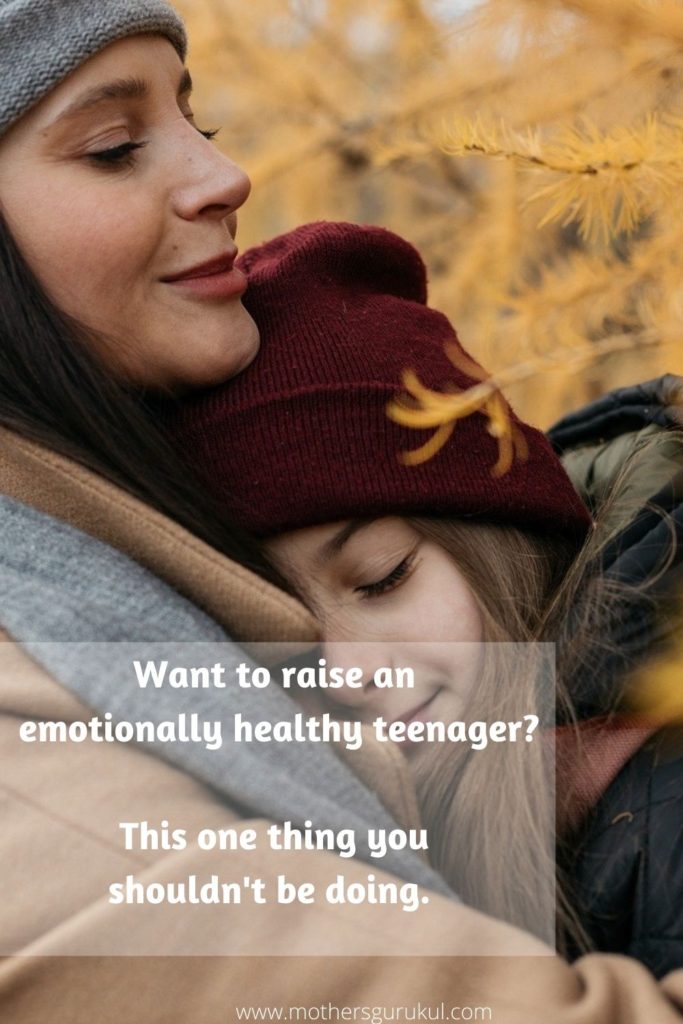We, as parents, love to give directions. But they, as children, don’t like those directions. Now, there is a clash; there are arguments, disagreements, and emotional outbreaks. How to handle all this? Should we stop giving them directions? Then how they will learn what is right and wrong? Well.. wait. If you want to raise an emotionally healthy teenager then first, take a pause, take a deep breath. And think. Think as kids, did we like directions? We say parenting is challenging; we say parenting has changed. Then how can we hold on to the old parenting style? Can we raise an emotionally healthy teenager (child) following the same old practices?
I am mother to a teenager. I see her mood swings almost every day. Her personality is changing with every passing year. Some new traits are adding up to her existing ones. She is becoming an independent person now. I do not agree to all her views. Sometimes, there is differences in our opinions. But that’s a part of parenting. She knows that I may not agree to all her views but I am always ready to have an open communication.

Coming back to our question – should we stop giving them directions?
So, there is a difference between telling and dictating. Our usual way of asking our kids to do something is, “I want your clothes to be folded and kept in the dresser.” Or “your room should be clean in 10 minutes.” Our kids, who are teenagers now, don’t like commands. They feel as if something is imposed on them. So, try to reframe these two sentences. Something like “if you fold your clothes and keep them in the dresser then you don’t have to think about what to wear tomorrow. Or “Try to clean your room before stepping out”. By changing the wordings, our child will see it as an idea and not as a command.
So what’s that one thing you should’t be doing?
Don’t Dictate Them. Guide Them.
No one likes commands. If someone will talk to us in that tone, will we like it? I am sure your answer is no. Children’s brains are still “cooking”. It needs a proper balance of sweetness and sourness. According to them, if we agree to what they say, it is sweetness; the rest is sour or even bitter.
Negotiation works better than dictating
Negotiating doesn’t mean you won’t often reserve the right, especially with younger children, to make a final decision yourself as the parent instead of giving them what they want.
Related article: Negotiating with pre-teens and teenagers
Make it their idea:
While talking about one of her school teachers, my daughter mentioned how her teacher makes the class lively. According to her, the teacher has a proper blend of strictness and friendliness. If we make them think that it was their idea, then chances are, they will accept it wholeheartedly. While doing this, you may have to take a step back and put a few things on hold, practice a take it easy attitude. But this step will make you and your child see things clearly. There are three ways of looking at a problem. Be the third person and get a full view. When your child will understand the reason behind your step, then whatever step s(he) will take, that will be their decision.
Ask questions instead of imposing your views:
With kids of all ages, asking questions can be the best way to get them thinking, internalizing lessons that stand the test of time: “What do you about the freedom kids are getting these days with the phone?” Likewise, letting them ask you questions, though sometimes awkward, can empower them and hold you accountable.
When your children make decisions, think about teaching them how to make decisions, rather than imposing your views. Because eventually, they need to learn to be accountable for their choices.
Avoid judgements and encourage them:
The more you help with the decision process while staying neutral, the more likely they’ll be influenced to share the tough choices they will face in the future. This discipline to not judge is one of the most challenging aspects of parenting. If you judge often and harshly, they’ll stop sharing. Their sharing is your best way to keep communication lines open and build trust.
Related article: How to connect with your pre-teenager?
The bottom line
The bottom line of this entire post is your teenage kid is not your cuddly baby anymore. But remember, their brains are still cooking. Sometimes, they can control their emotions, and sometimes, they cannot. But if we keep dictating them, giving them commands, we will never be able to match their wavelength.

These are great pointers Alpana and being a mom of almost a teenager, I could co-relate with them. kids listen to you and respond better, when they feel connected. agree, dictating them or giving them too many commands never work.
True
Raising up teens is really tricky among all other jobs in this world, and I advocate the pointers you have shared to raise an emotionally healthy teens. Loved the article.
Thank you Ruchi.
I also agree with the poit don’t dictate them, say it in simpler manner. I say many statements in fun manner then mood is light and tasks are done. Also liked the point that we should ask the right questions to know their point of view and in this process we should not mouth the answers to them.
Many questions can be answered when we keep the atmosphere light.
Such a lovely post and it is important to raise emotionally healthy teenager. My niece is a teenager and I can totally relate to this post. And I can see many similarities.
I am glad you could connect.
Can I agree more, you spoke my heart Alpana, I so believe in being friendly with kids n it works. Could so relate
Thank you Roma.
It’s not only teens but younger kids having strong opinions these days. Reframing sentences and open communication work great in such scenarios.
I agree.
Handling teenager is a challenge as there is so much of unnecessary exposure. But having an open communication and listening to them and treating them as an mature individual with giving importance to their opinion makes things easier.
I agree. These days, kids are getting matured way early than their age. And open communication is the only way to know whats going on with them.
You are absolutely right! To raise an emotionally healthy teenager, dictating will not work. Mental health issues are on a rise and you don’t want your teenage child to go through any stress whatsoever. Talking with your child, understanding their issues, and empathizing with them can go a long way in their overall well-being.
Absolutely!!
My son is 19… and I can relate to all that you have shared… Aah! The joys and challenges of raising teens. I have realized that teens have to be handled with Love, Laughter and Limits. Telling them or imposing your ideas does not work in the long run, but yes, making it their idea, involving them in the decision making, open communication truly helps to raise the teens well.
I am glad that as an experienced mom, you are agreeing to what I wrote.
Dealing with teenagers is a big challenge for parents. I agree that keeping conversations open and not trying to guide them but let them take initiative is the right way to go.
Yes Varsha.
I couldn’t agree more with you on this. Back in my teenage year, I so wanted people around me to treat me like a grown-up and not a child who needs instructions at everything. I am keeping all these posts bookmarked as I would surely be needing a lot of pointers/help once my little one turns into a teenager 🙂
I am sure, our parents must have had a tough time then. 🙂
I so agree with you Alpana. In fact in all our conversations I get to learn so much on sensitive and balanced pareting from you. And these ideas on raising a emotionally strong and balanced teenagers are very useful for all of us. Afterall they are soon to be adults and we need to treat them with due respect and manner.
Thank you Rakhi.
Yes, we cannot under-rate respect just because they are kids.
These are the great pointers and I guess it is very important to match their wavelength and we need to communicate more with them
Yes, communication is very important.
This is so true and goes with kids from all ages. Dictating is something that never works with kids – it just gives the wrong signal. I do most of these things with my son and he is only six. Very well-written post.
Agree. Just that when they are in teenage, kids become extra vulnerable.
I connect with each and every point you have mentioned here, Alpana. It is essential to understand them, their needs, choices, and reasons.
Yes.
Like you rightly said our teenagers are not babies anymore and we need to give them space and time to be themselves. we cannot always barge into their space and try to control them.
Absolutely.
These are such good pointers you have mentioned. EMotional well-being in kids and teens is very important for them to grow up to be good human beings.
Yes
Much helpful post Alpana. Raising a teenager is actually a strategic job. We have to make them feel that they are in top of the things
Yes